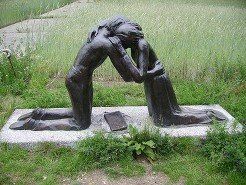
New Paragraph
Herbert Sulzbach after World War 2
re-education and reconciliation in Featherstone Park
Working as an Interpreter Officer, Sulzbach again had an extraordinary effect on the lives of thousands of prisoners, some of them high-ranking Nazis. His personal qualities, and the programme that he arranged, convinced them of the values of decency, humanity, and democracy. And through these German Prisoners of War, Sulzbach had his own reconciliation with the Germany that he had loved. When the camp closed in 1948, he joined in the Berlin air-lift and was demobbed at the end of that year.
German Embassy
Sulzbach joined the staff of the new German Consulate in London in 1951, where he worked for the next thirty years, retiring at the age of 87. He was passionately engaged in Anglo-German reconciliation. In his lifetime he was awarded nine different decorations, from six different Heads of State, which he recognised as reflecting the chaos of the Europe of his time.
Featherstone Park Association
Hundreds of ex-prisoners stayed in contact with Sulzbach. Post-war politics encouraged him to formalise his Anglo-German connections as the Cold War developed. The Featherstone Park Association was set up, with Sulzbach as its active President. Members met annually in Düsseldorf and in 1982 they erected the plaque in his honour at Featherstone.
Reconciliation
Herbert Sulzbach was ahead of his time in his intuitive understanding of, and engagement with, international reconciliation and democratic reconstruction. He was indefatigable in giving his time and his personality, and using his many contacts, to overcome hate and prejudice.